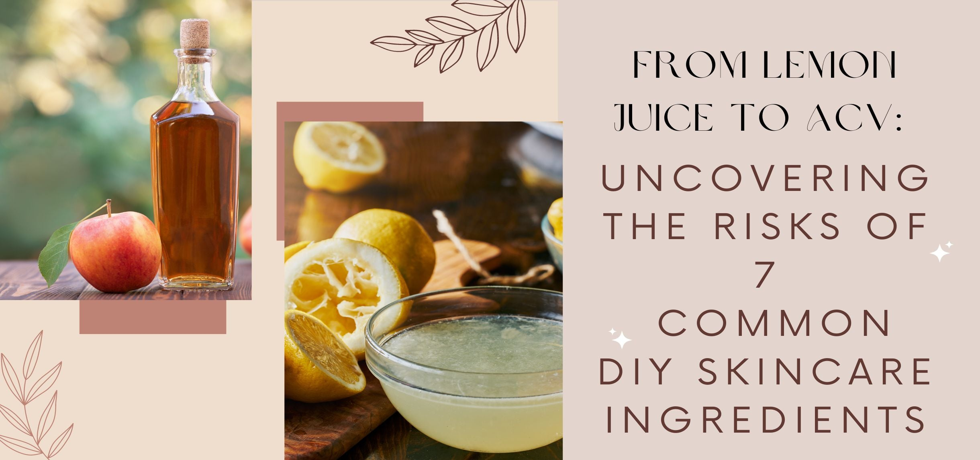
Unveiling the Truth: The Risks of DIY Skincare Ingredients
Your Guide to Understanding DIY Skincare Dangers
Understanding Common DIY Ingredients
The allure of using common household ingredients can lead to a false sense of security. For instance, while honey may have antibacterial properties, it can also trigger allergic reactions for some individuals. Similarly, coconut oil is known for its moisturizing benefits, but it may clog pores for those with oily or acne-prone skin. Properly evaluating these DIY skincare ingredients is crucial to avoid mishaps.
Lemon Juice: A Double-Edged Sword
Lemon juice is often celebrated for its brightening properties due to its high vitamin C content. However, the acidic nature of lemon juice can do more harm than good. It can lead to skin irritation and increased sensitivity to sunlight, causing complications such as chemical burns and hyperpigmentation. For this reason, it’s critical to explore gentler alternatives that won’t compromise your skin’s integrity.
The Risks of Baking Soda in Skincare
Many people use baking soda as an exfoliant or cleanser, believing it to be a safe and effective alternative. However, baking soda is alkaline and can disrupt the natural pH balance of the skin, leading to dryness and irritation. Its abrasive texture may cause micro-tears, which can worsen conditions like acne. Consider using natural exfoliants like oatmeal or finely ground sugar instead to promote a smoother complexion without compromising your skins health.
Apple Cider Vinegar: A Risky Beauty Risk
Apple cider vinegar (ACV) is frequently touted for its health benefits, but its use in skincare is questionable. High acidity levels can cause skin irritation and damage, especially when used undiluted. Moreover, using ACV as a toner can heighten sensitivity, leading to redness and a compromised skin barrier. Opting for alcohol-free toners designed for your skin type can yield better results without the risks.
Essential Oils: Aromatic Allies or Hazardous Helpers?
Essential oils have become increasingly popular in the DIY skincare community due to their therapeutic properties. However, they are powerful and can cause adverse reactions if not used with caution. For example, oils like peppermint can irritate sensitive skin, while citrus oils may heighten photosensitivity. Always dilute essential oils and incorporate them into your routine safely, or consider using products designed for sensitive skin.
Patch Testing: Your Best Defense
One of the most effective ways to avoid adverse reactions to DIY skincare ingredients is through thorough patch testing. Always conduct a test on a small area of your skin before applying any new ingredient widely. This proactive approach will help you identify any sensitivities your skin may have and can prevent unnecessary irritation.
Consulting Professionals: The Safe Option
While experimenting with DIY skincare can be tempting, consulting a professional is often the best path to achieving healthy skin. Dermatologists can provide personalized advice and recommend products that are safe and effective for your skin type. This way, you can avoid the myriad risks associated with DIY ingredients, ensuring your skincare journey remains safe and rewarding.
Conclusion: Embrace Safe Skincare Practices
In conclusion, while DIY skincare can be an enjoyable and creative pursuit, it’s essential to remain cautious. Recognizing the risks associated with common DIY ingredients helps you make informed choices that support your skin’s health. At The Skin Artistry, our goal is to guide you through the vast world of skincare, ensuring you have the knowledge and resources to care for your skin effectively.
FAQ
Are DIY skincare ingredients safe for everyone?
While some may find benefits in DIY ingredients, they can cause reactions in sensitive individuals. Its always advisable to patch test new ingredients.
What alternatives should I use instead of common DIY ingredients?
Consider safer alternatives specifically formulated for skincare, such as gentle cleansers and moisturizers designed for your skin type.
When should I consult a dermatologist?
If you experience persistent skin issues or reactions from DIY treatments, its wise to seek professional advice.
For professional assistance and expert advice from leading dermatologists like Dr. Hital Patel, experience the benefits of Unveiling the Truth: The Risks of DIY Skincare Ingredients with Hair & Skin Specialist Dr. Hital Patel at The Skin Artistry. Our clinics in PDPU Gandhinagar, Vastrapur Ahmedabad and Hyderabad (Visiting Consultant) offer top-quality care and personalized treatments. Visit us today to learn more about our services and take advantage of our special offers! For more insights, updates, or to collaborate, stay connected with The Skin Artistry.

